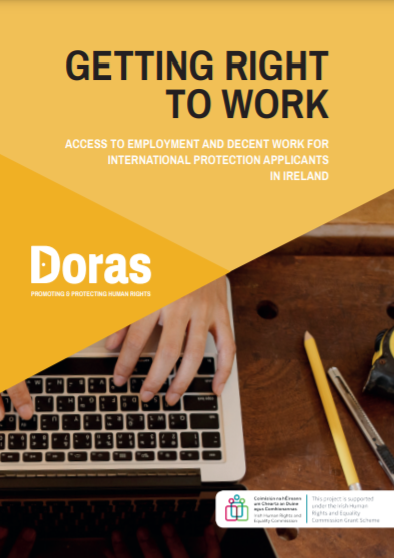Click here to download the report
This report contributes to the realisation of the right to decent work for international protection applicants in Ireland. It does so by documenting the barriers they face to obtaining employment and decent work, examining the effectiveness of employment support programmes, and identifying measures to be taken to ensure access to decent work for this target group.
Research over the last decade has shown that migrants’ experiences in the labour market is one of underemployment. Lack of recognition of qualifications and experience; poor pay rates, as well as terms and conditions; lack of promotional opportunities; lack of social capital; and discrimination all hinder access to work and/or progression. Several key problems have been identified. These include the intertwinement of employment and immigration enforcement; workers’ lack of awareness of employment rights; the ineffectiveness of labour inspections; the uncertain impact of undocumented status on employment rights; and difficulties with enforcing employment awards. And across the continuum of exploitation from relatively minor employment violations to forced labour and trafficking, vulnerability is at least partly created by a person’s irregular or precarious status. International protection applicants’ experiences are broadly similar. They must apply to the Immigration Service Delivery unit of the Department of Justice for permission to work, and if successful they are granted a permit in the form of a letter for a fixed period. This was extended from six to 12 months at the start of 2021. They also face other significant administrative barriers when it comes to getting work. These include difficulty opening bank accounts, and not being allowed to apply for driving licenses.
This report highlights how the range of employment schemes and supports operated by the Department of Social Protection to assist long-term unemployed people to return to work do not include the Daily Expenses Allowance paid to protection applicants living in Direct Provision. It also outlines the crucial role played by refugee/migrant support and other non-governmental organisations in facilitating successful labour market access for refugees and protection applicants. It provides a nonexhaustive list of NGO-run employment support programmes targeted at assisting refugees and protection applicants in Ireland. One of the main problems with these is the temporary and short term nature of the funding streams. This, combined with the relatively few evaluations of the services (linked to the nature of the funding provided) means there has been little opportunity to learn from and build on the work done to date in this area.


